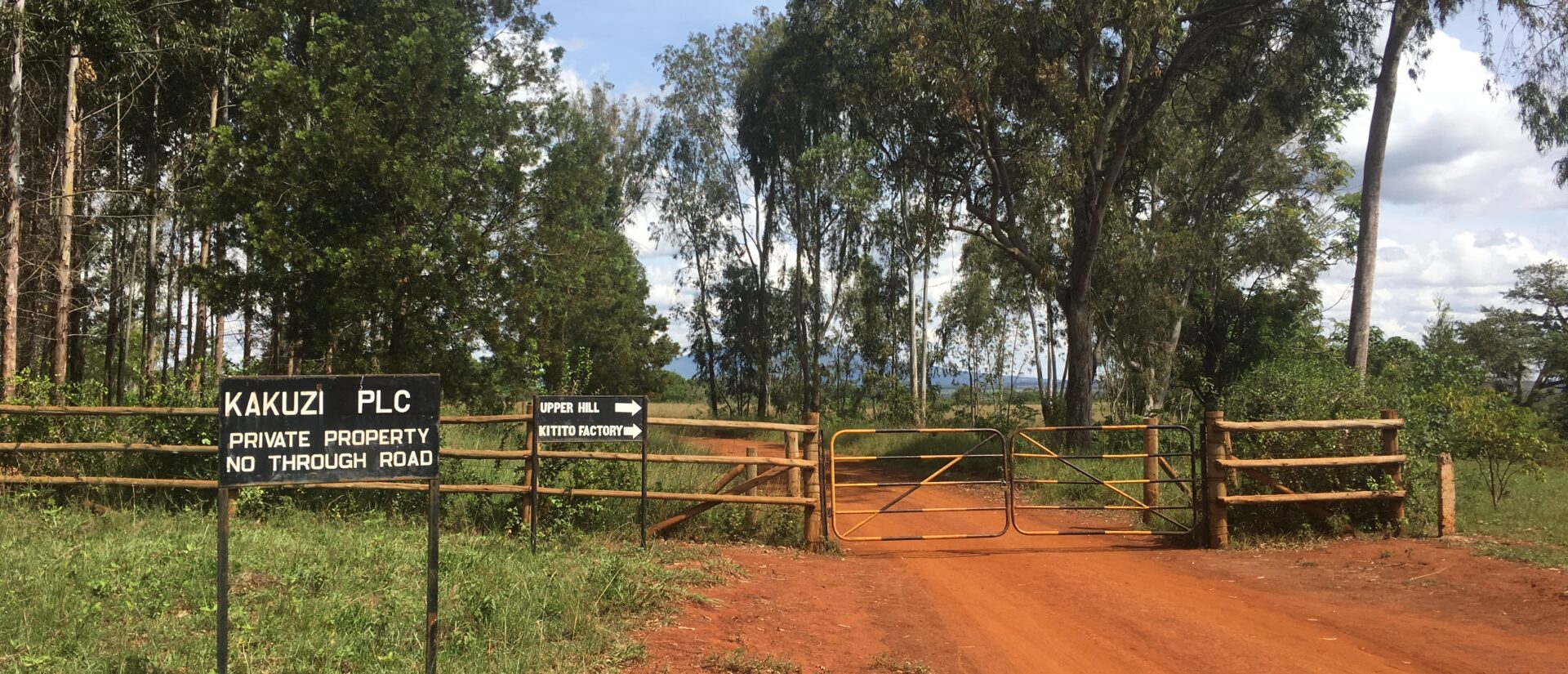
The people vs Kakuzi
An unrelenting fight for justice and remedy by rural Kenyan communities
Approximately 65 km northeast of Nairobi, in Murang’a county, eleven Kenyan , comprising of at least 30,000 members, are fighting for their historical land rights, but finding a big agricultural company in their way. The People vs Kakuzi PLC is a story of perseverance and hope against a long historical backdrop of colonialism, violence, poverty, and deprivation.
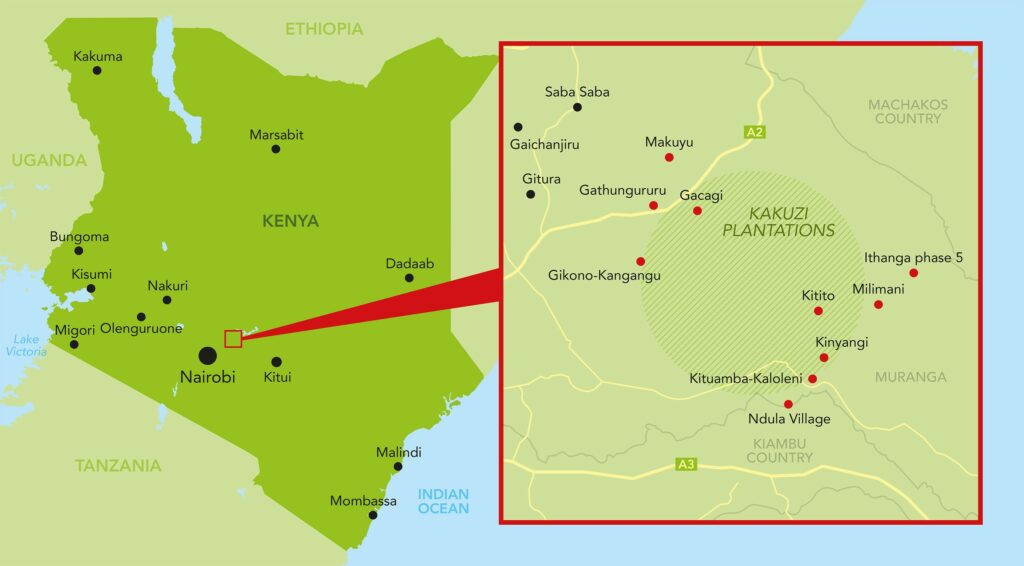 Photo: SOMO/Frans Schupp
Photo: SOMO/Frans SchuppStolen fruits
In Murang’a county, Kenyan agricultural company Kakuzi leases an area of almost 16,000 hectares, land that has been acquired from the invasion and colonisation of Kenyan territory by European powers onwards. Fertile farm lands were taken from people, many were forcibly displaced from their homes and put to work as slaves on the colonial plantations. Up until today, descendants of the original farming communities are dependent on wage labour on the Kakuzi farms and live under harsh conditions.
The story of Kakuzi is one of a colonial heritage that has not been dealt with, and continues to foster inequalities, dependency, impoverishment, and violations. Symptomatic of a longstanding injustice, the battle over land rights continues, and communities living on and adjacent to the Kakuzi estate are facing a myriad of serious human rights and environmental abuses. Amongst the most severe are alleged killings, assaults and rapes by Kakuzi guards. These allegations have been brought before the British courts(opens in new window) , where 79 claimants, represented by Leigh Day(opens in new window) , have sued Kakuzi’s parent company Camellia PLC, which is based in the UK.
This article describes the present-day problems these communities face. And it highlights the strategies communities have used to obtain remedies over the years, the triumphs they have experienced, the ongoing challenges, and the claim that remains: Give us back our ancestral land today.
“Colonisation never ended”
The history of Kakuzi began in 1906 when British settlers acquired 10,117 hectares of the land on which most of modern-day Kakuzi stands. The acquisition ignored the interests of the people who had owned and used the land under traditional tenure systems.
Throughout the 1920’s, 1930’s, and 1940’s there was systematic displacement of the local population who were forced to sign away their claim to their own land. In the 1950s there was further systematic displacement of those who remained on their land during the Kenya Emergency and the then British Administration’s policy of enforced villagization, in which vast swathes of people had their homesteads burnt and destroyed by British Colonial forces before they were moved and forced to live in enforced villages that were policed by British Colonial forces. Eventually, the local population was left marooned in squatter camps within Kakuzi land and many of them were forced to work on its sisal plantations in slave-like conditions.
After Kenyan Independence in 1963, the new government declared that land would be transferred from the departing settlers strictly on a ‘willing buyer, willing seller basis’. Local communities had no means to buy any land from the departing settlers. Besides, in the case of Kakuzi, there was little change at independence. The company obtained a new 999-year lease from the government in 1966 and continued its business as if nothing had changed.
Up until the early 2000s, the company has forcibly evicted communities from their lands to make way for their production. Despite putting up spirited resistance, these communities have been unable to stop the company from further encroaching on their lands, and forcibly evicting and displacing its inhabitants, including by using physical violence against them, and destroying their houses and slashing their .
Most people in these displaced communities – descendants of once independent farmers – live in impoverished conditions on or around the Kakuzi estate, considered and treated like ‘squatters’ by the . As they do not have land titles, they find themselves dependent on Kakuzi for employment and ‘favours’ such as access to basic amenities, services, and infrastructure, including water, firewood, health care, education, and roads. As one of the community members declared: “It is as if colonialism is still continuing here today, as if independence has not reached us”.
The struggle gains momentum
There have been continuous clashes between the company and the communities since the beginning of the twentieth century when, under British colonial rule, the displacements of the community began. A serious incident of violence(opens in new window) occurred in March 2002, when Kakuzi allegedly sent over 300 guards to Gathungururu to take back land from the community – with records of more than 20 people having been critically injured. Another example dates back to September when there was a demonstration at Gikono-Kangangu: a similar number of guards were reportedly brought together – and just under 40 demonstrators were arrested after having been beaten by the guards – many more who attended the protest were also beaten.
On 2 September 2016, the struggle gained considerable momentum(opens in new window) and national media attention(opens in new window) when another instance of violence by Kakuzi guards was caught on camera. On this date, pupils demonstrated against an alleged land grabbing attempt of a piece of the Kitito secondary school grounds. The demonstration was met with violence by Kakuzi guards (with involvement from police officers), who were filmed(opens in new window) charging at children and beating journalists. The school’s deputy principal, a school supervisor, and a local human rights defender were arrested in the aftermath of the protest and charged with incitement to violence, allegedly at the instigation of Kakuzi. It was at this time that SOMO, the Kenya Human Rights Commission (KHRC) and the Ndula Resource Centre (hereafter ‘NRC’), a community based organisation, came together to assist the communities in finding justice and remedy. Long before this partnership and as far back as 2004, the KHRC and NRC had already been pushing for justice for victims of Kakuzi’s abuses.
So, what kind of company is Kakuzi? A producer of sisal during the British colonial rule, the company evolved into a large producer of coffee and later avocados, macadamia nuts, wood, tea, beef, and blueberries. As such, its land ownership and usage is extensive(opens in new window) .
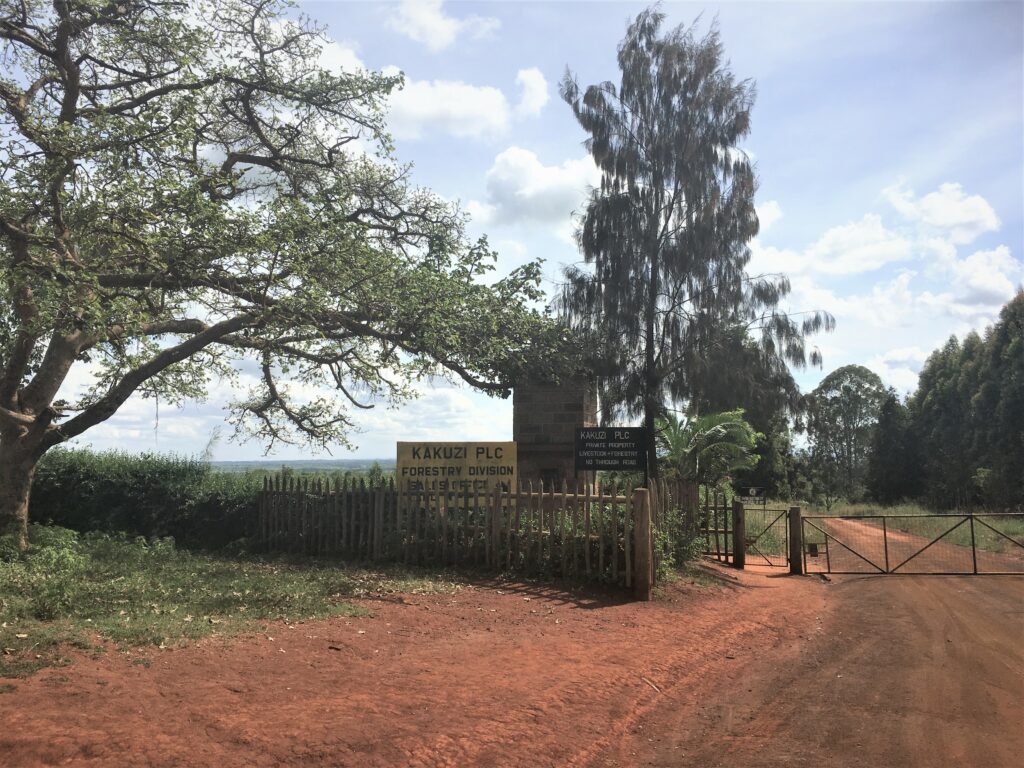
The controlling shareholder of Kakuzi is British Camellia PLC, owning 50.7 per cent of the company’s shares. The majority of the remaining shares are held by Kimani John Kibunga, a shareholder(opens in new window) born in the region where Kakuzi operates, and who joined Kakuzi’s Board(opens in new window) on 1 November 2020. Kakuzi’s biggest market for export is Europe.
Kakuzi profiles itself(opens in new window) as a responsible company that cares for its workers and surrounding communities. Unfortunately that is not the story that one comes across when they visit the area and speaks to the people living on and around the Kakuzi estate.
A tangle of human rights abuses and environmental impacts
Fact-finding missions, field visits, workshops, and various other engagements with community members since 2016, have brought to light a wide array of adverse human rights and environmental impacts experienced by the communities living on and around the land leased by Kakuzi. The historical land injustices appear to have created and maintained a fertile ground for a myriad of adverse impacts connected to Kakuzi operations.
Limited access to public facilities
Several public facilities are located inside the Kakuzi estate, such as schools, health centres, market places and police stations. However, since the land and roads within the parameters of the Kakuzi farms are not freely or easily accessible to members of the community that live on and around the company estate, these facilities can be difficult to access.
Catherine lives in a community that was driven from fertile farmland into the hills (“Milimani”) bordering the Kakuzi lands. The local primary school and the nearest hospital are six kilometres away. To get to these facilities, members of Catherine’s community must cross the Kakuzi fields on foot because motorised vehicles are not allowed. Children wishing to attend school must, therefore, get up at five o’clock in the morning to cross fields teeming with snakes and other dangerous animals. Women experiencing problems during childbirth and urgently needing hospital treatment have to be carried across this hilly land on a stretcher. Unsurprisingly, several women and their (unborn) children have reportedly died as a result of this arduous journey. “The blood of women and the children who have lost lives […] shall haunt the company. Kakuzi treats wildlife better than human beings,” says a woman from one of the affected communities.
Violence and criminalization
Firewood is the main source of energy for many communities in the area. If they are caught by , however, while looking for firewood, they risk being physically assaulted, including being raped, reported to the police for trespassing, or asked for a bribe or sexual favours.
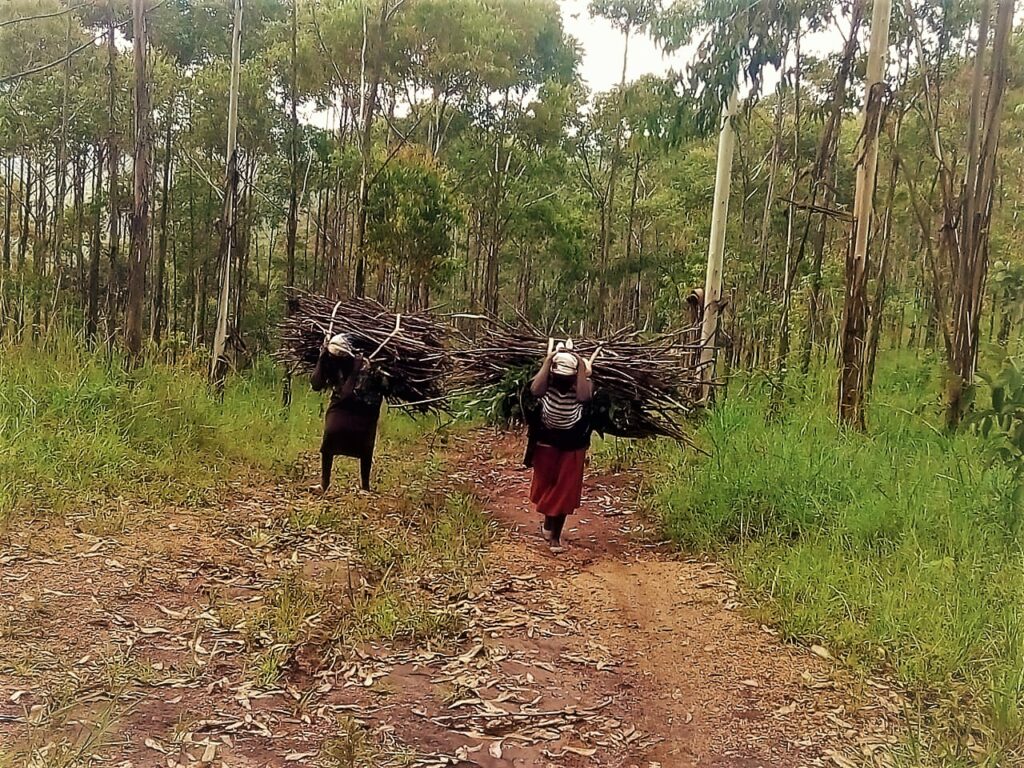 Photo: Swaleh Githinji
Photo: Swaleh Githinji People who stand up to allegations of stealing or trespassing, or to other injustices inflicted by Kakuzi, have been singled , brought to the police station on false reports, and sometimes imprisoned. Bail is required to be released, followed by representation at a trial. KHRC has been providing legal support to several human rights defenders (HRDs) who face trial, including a supervisor of Kitito Secondary School who had been arrested for taking part in unlawful assembly in 2016, after students of Kitito Primary and Secondary Schools protested Kakuzi’s takeover of land belonging to the . Another case that was supported by KHRC involved local HRDs who were arrested in 2019 and faced trumped up charges of stealing a camera from .
Joseph, a community member that was allegedly arrested and assaulted by Kakuzi guards in late April 2019, quotes: “Kakuzi has for far too long had its say and way in how it treats local communities with impunity. The courts must this time round, serve justice in my case of arbitrary arrest and defamation by the company security guards”.
Kakuzi employs several hundred guards to police its land holdings and the disproportionate use of violence by Kakuzi’s guards has resulted in a lawsuit in the UK against Kakuzi’s parent company, Camellia PLC. The 79 Kenyan claimants allege that “the guards intentionally and systematically mistreat members of the surrounding communities to physically punish local community members for either crossing Kakuzi property or raising issues against Kakuzi” and argue that Camellia PLC breached its duty of care to them to prevent Kakuzi’s security guards from assaulting them. The claimants are represented by UK-based law firm Leigh Day. The claimants’ case was filed in Court in June 2019 and served upon Camellia in July 2020, and the claimants are now awaiting Camellia’s .
Approaches to victims and human rights defenders
Since the case was served upon Camellia PLC, there have been worrying reports of Kakuzi making unsolicited direct approaches to victims. Local agents of the company regularly and systematically approached victims and fed them false information in relation to the status of the court case. They also harassed victims in an attempt to convince them to withdraw themselves from the case by settling their claims directly with Kakuzi and without legal assistance. These approaches caused distress to many victims who fear that Kakuzi will take action against them for bringing claims against it. After KHRC filed a complaint with local police concerning these approaches and once these practices were exposed in international media(opens in new window) , the approaches of the victims stopped. However, since early November, human rights defenders who have been supporting the victims and larger communities are now being requested for hearings by the Directorate of Criminal Investigations of the Kenyan police in Murang’a County, in which officers have attempted to obtain the identities of the victims represented in the case against . In the meantime, the Murang’a County Assembly has established a committee concerning “the alleged boycott of avocado exports from Kakuzi by key grocery outlets in the United Kingdom”, which aims to “find out the truth about the allegations” of rights violations against workers and people living around the . Following a damning article(opens in new window) in the UK Sunday Times about (sexual) violence allegedly committed by Kakuzi guards and the links to UK supermarket Tesco, Lidl and Sainsbury’s as buyers of Kakuzi avocados, the UK supermarkets suspended(opens in new window) their contracts with Kakuzi.
Workers’ rights violations
Kakuzi is the biggest employer in the wider area and the vast majority of those living in the vicinity depend on the company for their livelihoods. However, workers have reported a number of labour rights violations to NRC, the KHRC and SOMO. As one union leader puts it; the workers engage in a struggle “to put to an end an era of continued and deliberate workers’ ”.
In recent years more and more workers have only been offered temporary contracts, sometimes for several years in a row, on either a bi-monthly or monthly basis, or just as day . Temporary contracting practices allow Kakuzi to avoid employees accruing permanent employee rights such as paid leaves (maternity, paternity and annual) and other benefits such as transport allowance: they hire someone for three months, let them go for three months and then hire them again on a new payroll number and different terms in order to evade legal obligations such as provision of gratuity.
Once a temporary contract comes to an end, a new batch of workers arrives to take over the work, and the (now) ex-worker has to wait for a new term and temporary contract. This uncertainty over income creates a dependency on Kakuzi, often exploited by Kakuzi management. The high level of dependency and the small number of organised workers allow the company management to set unrealistic targets and not pay overtime. In the past, (ex-) workers have reported unrealistic daily targets -for picking avocados where workers at the time were required to harvest at least 2,000 avocados daily or for the distribution of fertilizer, for example- requiring 12 hour working days for eight hours pay, and being denied pay for the days on which they didn’t meet the targets.
These targets also create perverse incentives to take risks. Several women, for example, were injured when they fell from avocado trees while trying to harvest some of the higher hanging fruit. And ex-workers testify that while the women were at hospital, documentation of their treatment was confiscated, preventing them from claiming compensation for health care bills and loss of income from the company. The few who were lucky to get medical records from hospitals allege that the documents were confiscated at the police stations when they reported the occupational .
Sexual violence and harassment
Female workers have been subjected to sexual harassment by managers and male supervisors. While working in the trees to pick avocados, male supervisors have reportedly flipped up their skirts and tried to poke them with . One of the women working on the avocado farm states “Women workers suffer a lot here and if we had other options, we would not be here.”
Due to the dependency on the (uncertain) employment by Kakuzi, women workers face particular vulnerabilities. In a number of cases, male managers demanded sexual favours in exchange for employment or promotion of female workers. In 2018, the local branch of the trade union received a complaint from two women who were seeking employment as security officers at Kakuzi. They were asked by two managers to meet them at a hotel in the nearby Kenol Township after working hours to discuss the job offer and contract. When they got there, they discovered that the two managers had booked rooms in the hotel and propositioned them for sexual favours. The two women declined and the job offers were .
Environmental concerns
Several communities living on the Kakuzi estate have complained of their water resources drying up. The company has planted eucalyptus trees near their water sources; these trees drain large amounts of water from the soil, resulting in a significant decrease of water supply for the communities.
Another environmental concern faced by communities living near Kakuzi farms are human-wildlife conflicts, exacerbated by Kakuzi’s hiring of so-called ‘baboon handlers’. The company hires people to chase baboons off its plantations, and as a result the animals head towards neighbouring communities to look for food. Since communities do not have equal resources to deal with the baboons, they can only watch helplessly as their crops are destroyed.
Peoples’ victories
Despite the unequal power relation between the communities and the company, and the long shadow of British colonial rule and the historical land injustices that came with it, the community members have achieved some important victories during their struggle, including through support by SOMO, KHRC, and NRC.
With the help of NRC, community members have become more organised by forming steering committees and by setting up a central advisory board that includes all the impacted communities and informs and steers the joint struggle. They have also forged relationships with a wide range of communities and organisations in Kenya and other countries, making it easier to get their voices heard. The communities have attracted political attention and support for their struggle, building relationships with government officials able to influence their situation.
The National Land Commission of , for example, last year ordered that Kakuzi land leases should not be renewed until all historical land injustice grievances are conclusively resolved, and that current leases should revert back to 99 years in length, as opposed to the existing 999. Kakuzi was further ordered(opens in new window) to ‘surrender all the land within its 100,000-acre complex for public use’. The order to surrender land, along with other victories, led to massive celebrations(opens in new window) on the 15th of April 2019.
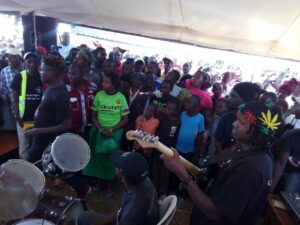
The decision of the NLC is an important step in achieving this goal, but Kakuzi has proven itself to be a tough opponent who will put up a fight, and has challenged the NLC mandate in court. So there are court cases and allegations back and forth, and the relations are grim.
Another win for those adversely affected by Kakuzi’s operations, albeit temporary, was the retraction of the Rainforest Alliance of its Makuyu avocado plantation from July 2018 to October 2019. The avocado farm temporarily lost its Rainforest Alliance certificate following a confidential complaint(opens in new window) by KHRC, NRC and SOMO.
In April 2019, KHRC contacted the Ethical Trading Initiative (ETI) and provided them with a brief about the human rights violations at Kakuzi, as Kakuzi sells most of its produce to ETI members. ETI then commissioned an independent and confidential investigation into the violations. KHRC was made aware that its claims were valid and that Kakuzi was asked to address the issues raised in the investigation report.
Probably no coincidence, shortly after losing the Rainforest Alliance certification and following the ETI investigative report, Kakuzi launched its Sexual Harassment Awareness, Reporting and Prevention (SHARP) programme and, since then, workers have noted some improvements in conditions on this specific farm, such as a more stringent policy on sexual harassment and the removal of unrealistic harvesting targets, and a positive change in working hours.
The certification was restored in October 2019, to the discontent of the workers and community members we are in touch with, since the big picture still looks very bleak. NRC, the KHRC and SOMO are thus in the process of assisting those aggrieved to file another formal complaint with Rainforest Alliance with a twofold aim: to make it impossible for European consumers to buy Kakuzi avocado’s with Rainforest Alliance seal, and to complain about the recertification process in itself, in which the people were not heard.
Following an alert from the KHRC and SOMO, the United Nations Working Group(opens in new window) on Business and Human Rights visited Kakuzi and picked up on some of the concerns raised here including dismissals of union leaders, disproportionate violence by guards and work-related accidents in relation to picking targets. Kakuzi is now working with the Kenya National Commission on Human Rights (KNCHR) in an attempt(opens in new window) to align the company policies with the international normative framework.
Unfinished business
While some improvements have definitely been achieved, the work is far from finished. Violent clashes between Kakuzi guards and community members continue until today, there is a lot of distrust towards the company, and the community members we spoke to do not believe Kakuzi will genuinely respond to their complaints. Kakuzi’s response to the NLC petitions and its behaviour in the civil case in the British court support this suspicion.
Members of the affected communities express their determination to continue their quest for both restorative and reparative justice, a public apology, and a guarantee for non-repetition. They also express their determination to address the historic land injustice, and pursue compensation for their loss of livelihoods, and the psychological harms suffered. Several leaders in this struggle are clear in their mission; “we want the company and the government to acknowledge the longstanding injustices perpetrated against our people”.
KHRC, Ndula Resource Center and SOMO call on Kakuzi to prevent and address all human rights violations against workers and community members, and we urge Camellia to assume its responsibilities as a parent company, and ensure that Kakuzi’s activities do not violate the UNGPs. Furthermore, Kakuzi must immediately cease its intimidation of witnesses in the court case against Camellia, so that justice can take its course. For too long, Kakuzi’s business has been built on (historic) injustices. It is time to pave the way for a just future. Starting today. O/Frans Schupp
Do you need more information?
-

Lydia de Leeuw
Researcher
Partners
-
Ndula Resource Centre
Related content
-
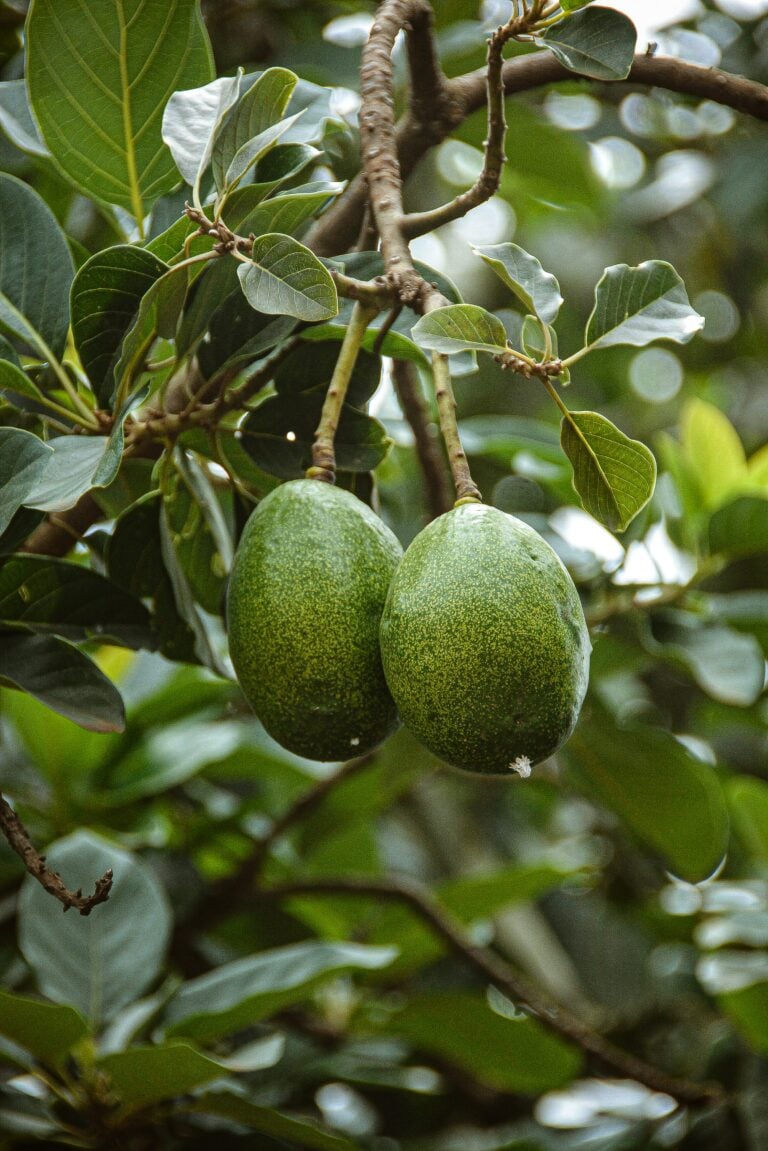 Large Kenyan agribusiness under fire for assault and rapePosted in category:News
Large Kenyan agribusiness under fire for assault and rapePosted in category:News Lydia de LeeuwPublished on:
Lydia de LeeuwPublished on: -
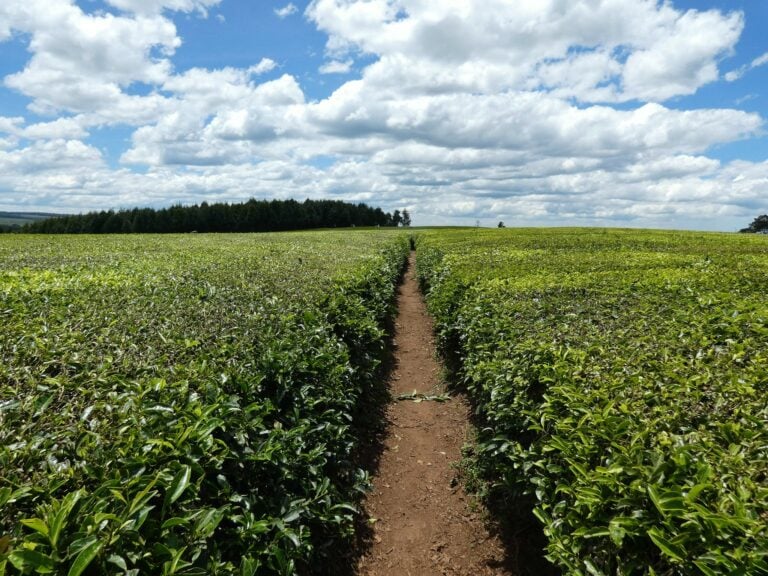 Victims of violence at Unilever tea plantation take complaint to the UNPosted in category:News
Victims of violence at Unilever tea plantation take complaint to the UNPosted in category:News Lydia de LeeuwPublished on:
Lydia de LeeuwPublished on: -
Unilever was negligent in protecting its own employees in KenyaPosted in category:Published on:Statement
-
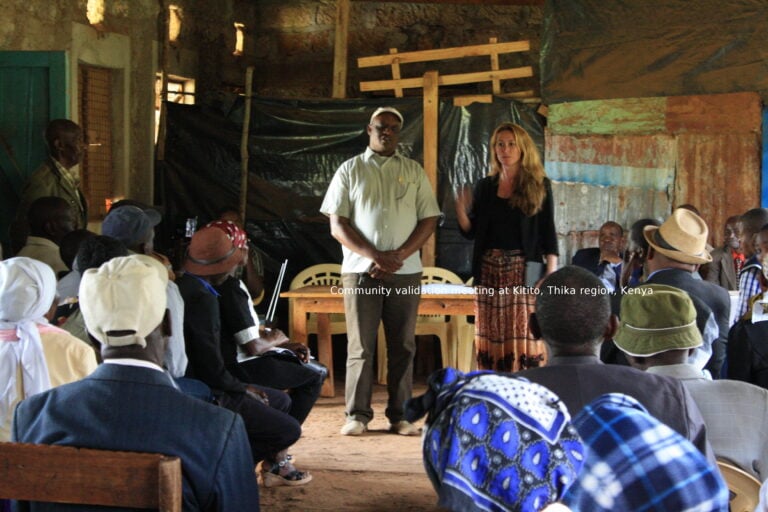 Strengthening capacity of civil society in Tanzania and Kenya to influence business and human rights affairsPosted in category:News
Strengthening capacity of civil society in Tanzania and Kenya to influence business and human rights affairsPosted in category:News Rachid BelkhirPublished on:
Rachid BelkhirPublished on:

